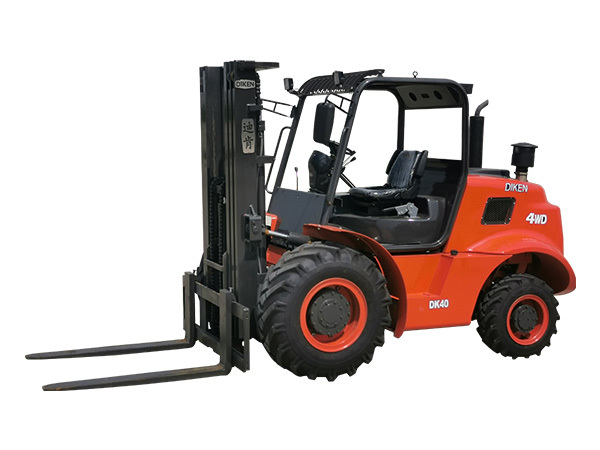Diken news
Maximize Productivity with a 2 Ton Off Road Forklift in Rugged Terrain
Release time: 2025-09-26
Maximize Productivity with a 2 Ton Off Road Forklift in Rugged Terrain
In the fast-paced world of logistics and transportation, maximizing productivity is paramount, particularly in rugged terrains where traditional forklifts may falter. A 2-ton off-road forklift stands out as a robust solution, designed to handle challenging environments efficiently. In this article, we will delve into how this versatile machine can enhance your operational efficiency, safety, and overall productivity. From understanding its features to implementing best practices, we cover everything you need to know about utilizing a 2-ton off-road forklift effectively.
Table of Contents
- Understanding Off-Road Forklifts
- Key Features of 2 Ton Off-Road Forklifts
- Advantages of Using 2 Ton Off-Road Forklifts
- Applications in Rugged Terrain
- Best Practices for Using Off-Road Forklifts
- Safety Considerations
- Maintenance for Maximum Productivity
- Conclusion
- Frequently Asked Questions
Understanding Off-Road Forklifts
Off-road forklifts are engineered to navigate uneven, gravel, mud, and rocky terrains that regular forklifts cannot traverse without risking performance and safety. Unlike traditional forklifts, which are primarily designed for indoor use, these robust machines boast larger tires, enhanced ground clearance, and a more powerful engine to tackle the challenges posed by rugged environments.
Types of Off-Road Forklifts
Off-road forklifts come in various types, including:
- Rough Terrain Forklifts: These are designed specifically for outdoor use and can maneuver through uneven surfaces easily.
- Telehandlers: Versatile machines that provide both lifting and reaching capabilities, making them ideal for construction sites.
- All-Terrain Forklifts: These combine features from rough terrain and telehandlers, offering an excellent solution for varied environments.
Key Features of 2 Ton Off-Road Forklifts
A 2-ton off-road forklift is equipped with several features that make it suitable for rugged terrain:
1. Powerful Engine
These forklifts typically come with robust engines, providing the necessary torque and horsepower to navigate steep inclines and heavy loads.
2. Enhanced Ground Clearance
With higher ground clearance, off-road forklifts can easily navigate over obstacles and rough terrain without bottoming out.
3. Large, Traction-Focused Tires
These machines are fitted with larger tires designed to maximize traction on challenging surfaces, ensuring stability and safety while operating.
4. Four-Wheel Drive Capability
The four-wheel drive system provides increased control and maneuverability, particularly on uneven surfaces, allowing for safer operation.
5. Ergonomic Design
Modern off-road forklifts are designed with operator comfort in mind, featuring adjustable seating and intuitive controls that enhance usability and minimize fatigue during long hours of operation.
Advantages of Using 2 Ton Off-Road Forklifts
Investing in a 2-ton off-road forklift can provide numerous advantages:
1. Increased Productivity
These forklifts are designed for maximum efficiency, enabling quicker loading and unloading processes, which ultimately leads to increased productivity on job sites.
2. Versatility
Off-road forklifts can be utilized in various industries, including agriculture, construction, and logistics, making them a versatile addition to any fleet.
3. Cost-Effectiveness
While the initial investment may be higher than traditional forklifts, the long-term benefits, including reduced downtime and maintenance costs, often outweigh the costs.
4. Safety Enhancements
With features like superior traction and stability, off-road forklifts reduce the risk of accidents and injuries associated with operating on uneven surfaces.
5. Environmental Adaptability
These forklifts can operate in various weather conditions, making them ideal for outdoor work regardless of environmental factors.
Applications in Rugged Terrain
2-ton off-road forklifts find their utility in several rugged applications:
1. Construction Sites
They are essential for moving materials across uneven terrain, ensuring that building projects run smoothly and efficiently.
2. Agricultural Operations
Farmers utilize these forklifts to transport heavy loads of crops and equipment over fields, enhancing productivity during harvest seasons.
3. Mining Operations
In mining, off-road forklifts are crucial for transporting heavy tools and materials around rugged sites safely and efficiently.
4. Warehousing in Challenging Locations
For warehouses situated in hilly or uneven terrain, a 2-ton off-road forklift provides the necessary mobility to move goods effectively.
Best Practices for Using Off-Road Forklifts
To maximize the effectiveness of a 2-ton off-road forklift, consider the following best practices:
1. Conduct Regular Training
Ensure that operators are well-trained in using off-road forklifts, emphasizing safety and efficiency.
2. Perform Pre-Operation Checks
Always conduct thorough inspections before use, checking fluid levels, tire pressure, and battery functionality.
3. Load Management
Be mindful of weight limits and distribute loads evenly to maintain stability and safe operation.
4. Operate at Safe Speeds
Encourage operators to maintain safe speeds, especially when navigating uneven terrain or making turns.
5. Utilize Safety Gear
Ensure all operators and nearby personnel wear appropriate safety gear, including helmets, gloves, and visibility vests.
Safety Considerations
Safety should always be a priority when operating a 2-ton off-road forklift:
1. Operator Training
Comprehensive training programs must be in place to equip operators with the necessary skills to handle the machine safely.
2. Use of Spotters
In densely populated areas or challenging terrains, employing spotters can help prevent accidents and ensure safe navigation.
3. Environmental Awareness
Operators should be aware of their surroundings, including potential hazards such as slope instability, uneven terrain, and pedestrian presence.
4. Emergency Protocols
Establish clear emergency protocols and ensure all staff are familiar with them to respond effectively in the event of an accident.
Maintenance for Maximum Productivity
To keep a 2-ton off-road forklift operating efficiently, regular maintenance is key:
1. Scheduled Maintenance
Follow the manufacturer’s guidelines for scheduled maintenance, including oil changes, brake inspections, and tire checks.
2. Daily Checks
Implement a routine for operators to conduct daily checks before use, ensuring all systems are functioning correctly.
3. Addressing Repairs Promptly
Any issues detected during inspections should be addressed immediately to prevent further damage and ensure continued productivity.
4. Cleanliness
Keep the forklift clean, especially the undercarriage, to prevent dirt accumulation that could affect performance.
Conclusion
Incorporating a 2-ton off-road forklift into your operations can significantly enhance productivity, especially in rugged terrains. By understanding its features, advantages, and best practices, businesses can maximize their efficiency while ensuring safety. The ability to navigate challenging environments with ease makes this piece of equipment an invaluable asset in various industries. Investing in proper training and maintenance will ensure that you harness the full potential of your forklift, leading to improved operational outcomes and overall success.
Frequently Asked Questions
1. What types of terrains can a 2-ton off-road forklift navigate?
A 2-ton off-road forklift is designed to handle uneven, rocky, muddy, and gravelly terrains, making it suitable for various outdoor applications.
2. What is the weight capacity of a 2-ton off-road forklift?
The nominal weight capacity is 2 tons, but it is essential to consider load distribution and other factors to ensure safe operation.
3. How often should maintenance be performed on an off-road forklift?
Regular maintenance should follow the manufacturer’s recommendations, with daily checks and scheduled servicing to ensure optimal performance.
4. Are there specific safety regulations for operating off-road forklifts?
Yes, operators must comply with relevant safety regulations, including proper training, use of personal protective equipment, and adherence to safe operating practices.
5. Can off-road forklifts be used indoors?
While off-road forklifts are primarily designed for outdoor use, they can be used indoors if the flooring is stable and suitable for their operation; however, caution is advised to avoid damaging surfaces.
Keywords: 2 ton off road forklift









